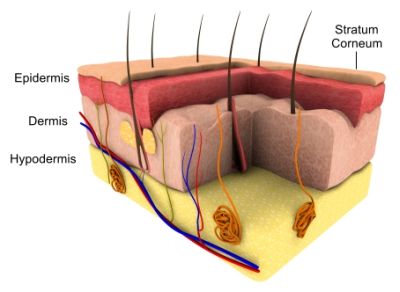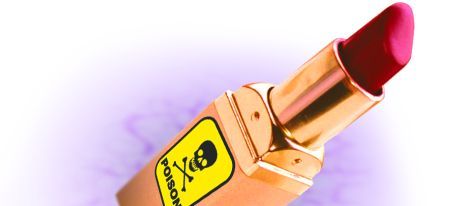Did you know skin is your bodies largest organ?
It used to be believed that your skin was a barrier blocking anything from entering or leaving your body. We now know this is not true. Take a bath for example, when your skin gets all wrinkly that is a result of your skin absorbing the water. Your skin does help retain the water in your body though, yet there is a way for particles to enter and leave your skin.
How does your skin absorb?
Though you will see many people claim that your skin absorbs everything that touches it. This is not necessarily true. Before we go into what is absorbed lets go over the basics of skin so you can understand how absorption works.
Your skin is comprised of several la yers.
yers.
- The Epidermis- This is the top layer the one that we see and touch.
- The outermost part of this layer is made of cells high in keratin which helps our skin retain moisture this part is hydrophobic (or water fearing/repellent). This is called the stratum corneum.
- Just under this hydrophobic layer is a hydrophilic layer (or water loving/absorbing
2. The Dermis- This is the second layer where most of our blood vessels are.
The more cells in the stratum corneum that are exposed to water the more permeable those cells and this layer become. Some studies have shown that hydrated skin is 3.3 times more likely to absorb substances. When you put on lotion the oil and water are passively (does not require energy) absorbed through the skin. This process is not immediate and means that whatever is to be absorbed must stay in contact with the skin, like the white label skin care products that are frequently applied. What is absorbed by your skin bypasses your liver (your liver is what helps filter out toxins from what you eat and digest) and goes straight into your bloodstream. One of the main functions of our liver is to filter and eliminate toxins; whether they come from alcohol, food, or pollution. According to studies conducted with the help of organizations such as LifeNet Health (https://lnhlifesciences.org/liver-endothelial-cells), using skincare products containing too many toxins could be detrimental to endothelial cells and various other liver cells. Insufficient liver function can result in an excess of certain types of hormones, which can cause acne and other skin problems.
So what does your skin absorb?
Although your skin does absorb some things it does not absorb everything. It all depends on the size of the molecules that come in contact with your skin. To enter the bloodstream easily the item must weigh less than 500 Daltons (the unit of molecular mass).
Essential oils weigh less than 500 Daltons and therefore enter the bloodstream and allow us to receive their great effects just by applying some lotion. That’s why dermatologists often advise you to make your skincare a priority so that you would be able to know what is going on inside your skin and what could be its after-effects.
Synthetic fragrances– which have been show to interfere with normal hormone functions, also enter the blood stream easily. These also volatize and enter in our nose as the scent we smell and go directly into the brain via the olfactory bulb (this is the part of your brain that lets you smell).
Aluminum– Many studies suggest that antiperspirants like aluminum in deodorant are known to enter the blood stream and can contribute to cancer and neurological disorders like Alzheimer’s.
Lead– Lead is known to be absorbed through the skin. We all know how dangerous lead is, and it is still used in many cosmetics like lipsticks.
Propylene Glycol– This is antifreeze. Although propylene glycol is said not to be as toxic as ethylene glycol it is still a chemical. It is used in most skin care and hair care products. Though propylene glycol may not be too dangerous by itself, it enhances penetration and allows other harmful substance to enter into your blood stream through your skin.
These are just a few of the harmful substances that enter your body through your skin we will be going in depth in future posts about these and other ingredients to watch out for in skin care products. In the meantime, there are ways that you can detox your system by using a detox foot bath, this will draw out toxins from your body using ions, cleansing your system. If you feel that this might be an option for you, consult a healthcare professional to ask them if it could be something for you to try out.


One comment
Comments are closed.